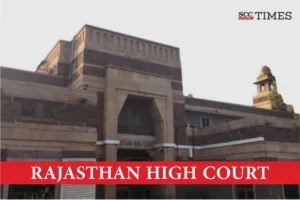Rajasthan High Court: In a petition filed by the petitioner, Actress Shilpa Raj Kundra, seeking the quashment of FIR for offenses under Section 153-A of the Penal Code, 1860 (IPC) and Sections 3(1)(r) & (u) of the Scheduled Castes and Scheduled Tribes (Prevention of Atrocities) Act, 1989 (SC/ST Act), a single-judge bench of Arun Monga, J., held that the FIR lacked legal and factual merit, failed to establish essential ingredients of the alleged offenses, constituted an abuse of the process of law and accordingly, quashed the FIR.
In the instant matter, a FIR was filed based on a complaint, alleging that film actors Salman Khan and Shilpa Raj Kundra used the term “Bhangi” in a 2013 television interview, offending sentiments of the Valmiki community. The FIR was registered in December 2017, after more than three years of the said interview. The petitioner filed the present petition seeking to quash the FIR and argued that the alleged remarks lacked malicious intent, were taken out of context, and did not constitute any of the offenses alleged under the IPC or the SC/ST Act.
The petitioner contended that the FIR was filed over three years after the alleged remarks and lacked any explanation for the delay, thereby rendering it doubtful and legally unsustainable. It was contended that the SC/ST Act provisions mentioned in the FIR were introduced in 2016 and since the interview occurred in 2013, these provisions cannot be applied retrospectively. It was contended that the remarks lacked any intent to promote enmity or insult the Valmiki community, as required under Section 153-A IPC and the SC/ST Act. It was lastly contended that the cognizance of Section 153-A IPC was barred under Section 196 CrPC due to the absence of government sanction.
However, the prosecution contended that the FIR should not be quashed at the investigation stage, as incriminating material could emerge during the inquiry. It was contended that the words used were derogatory and caused social unrest, justifying the continuation of proceedings.
The Court observed that the unexplained delay in lodging the FIR cast serious doubts on its credibility, thereby violating the principles laid down by the Supreme Court in Manoj Kumar Sharma v. State of Chhattisgarh, (2016) 9 SCC 1. The Court noted that since the provisions of the SC/ST Act invoked in the FIR were introduced post-2013, therefore they are inapplicable. The Court noted that the absence of mandatory sanction under Section 196 CrPC further rendered the FIR invalid.
The Court stated that the SC/ST Act requires specific intent to insult or harm members of the community. The Court noted that the said remarks were made in a casual context without evidence of intent to humiliate or harm the Valmiki community, as required under the SC/ST Act. The Court asserted that the FIR lacked any such allegation or evidence, and the term “Bhangi,” while offensive in certain contexts, did not meet the legal threshold for invoking the Act.
The Court further asserted that the FIR failed to establish the intent to promote enmity or disrupt public tranquility as required under Section 153-A IPC. The Court stated that the casual remarks made by the petitioner which lacked malicious intent did not meet the stringent requirements of Section 153-A IPC. The Court held that the FIR constituted an abuse of legal process and quashed it in its entirety.
[Shilpa Raj Kundra v. State of Rajasthan, 2024 SCC OnLine Raj 3362, Decided on 18-10-2024]
Advocates who appeared in this case :
Mr. Prashant Patil with Mr. Shakti Pandey, Mr. Gopal Sandhu, Ms. Palak Saxena and Mr. Atishay Jain, Counsel for the Petitioner;
Mr. Vikram Rajpurohit, P.P., Counsel for the Respondents.


